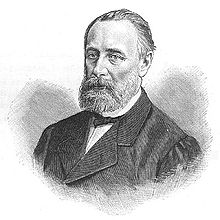- Mikhail Katkov
-
Mikhail Nikiforovich Katkov (Russian: Михаи́л Ники́форович Катко́в) (February 13, 1818 - August 1, 1887) was a conservative Russian journalist influential during the reign of Alexander III.
Katkov was born of a Russian government official and a Georgian noblewoman (Tulayeva). On finishing his course at the Moscow University Katkov devoted himself to literature and philosophy, and showed so little individuality that during the reign of Nicholas I he never once came into disagreeable contact with the authorities. With the Liberal reaction and strong reform movement which characterized the earlier years of Alexander II's reign (1855-1881) he thoroughly sympathized, and for some time he warmly advocated the introduction of liberal institutions of the British type, but when he perceived that the agitation was assuming a Socialistic and Nihilist tinge, and that in some quarters of the Liberal camp indulgence was being shown to Polish national aspirations, he gradually modified his attitude until he came to be regarded by the Liberals as a renegade.
At the beginning of 1863 he assumed the management and editorship of the Moscow News, and he retained that position till his death in 1887. In the first year of his editorship, Moscow News had a circulation of 6000. By 1866, the circulation had risen to 12000. During the twenty-four years of editorship he exercised considerable influence on public opinion and even on the Government, by representing with great ability the moderately Conservative spirit of Moscow in opposition to the occasionally ultra-Liberal and always cosmopolitan spirit of St Petersburg. With the Slavophiles he agreed in advocating the extension of Russian influence in the Balkans, but he carefully kept aloof from them and condemned their archaeological and ecclesiastical sentimentality.
Though generally temperate in his views, he was extremely incisive and often violent in his modes of expressing them, so that he made many enemies and sometimes incurred the displeasure of the press censure and the ministers, against which he was more than once protected by Alexander III in consideration of his able advocacy of national interests. He is remembered chiefly as an energetic opponent of Polish national aspirations, of extreme Liberalism, of the system of public instruction based on natural science, and of German political influence. In this last capacity he helped to prepare the way for the Franco-Russian Alliance. After Katkov's death his place at the helm of the conservative party was taken by Konstantin Pobedonostsev and Aleksey Suvorin.
 This article incorporates text from a publication now in the public domain: Chisholm, Hugh, ed (1911). Encyclopædia Britannica (11th ed.). Cambridge University Press.Categories:
This article incorporates text from a publication now in the public domain: Chisholm, Hugh, ed (1911). Encyclopædia Britannica (11th ed.). Cambridge University Press.Categories:- 1818 births
- 1887 deaths
- Imperial Russian politicians
- Russian journalists
Wikimedia Foundation. 2010.

